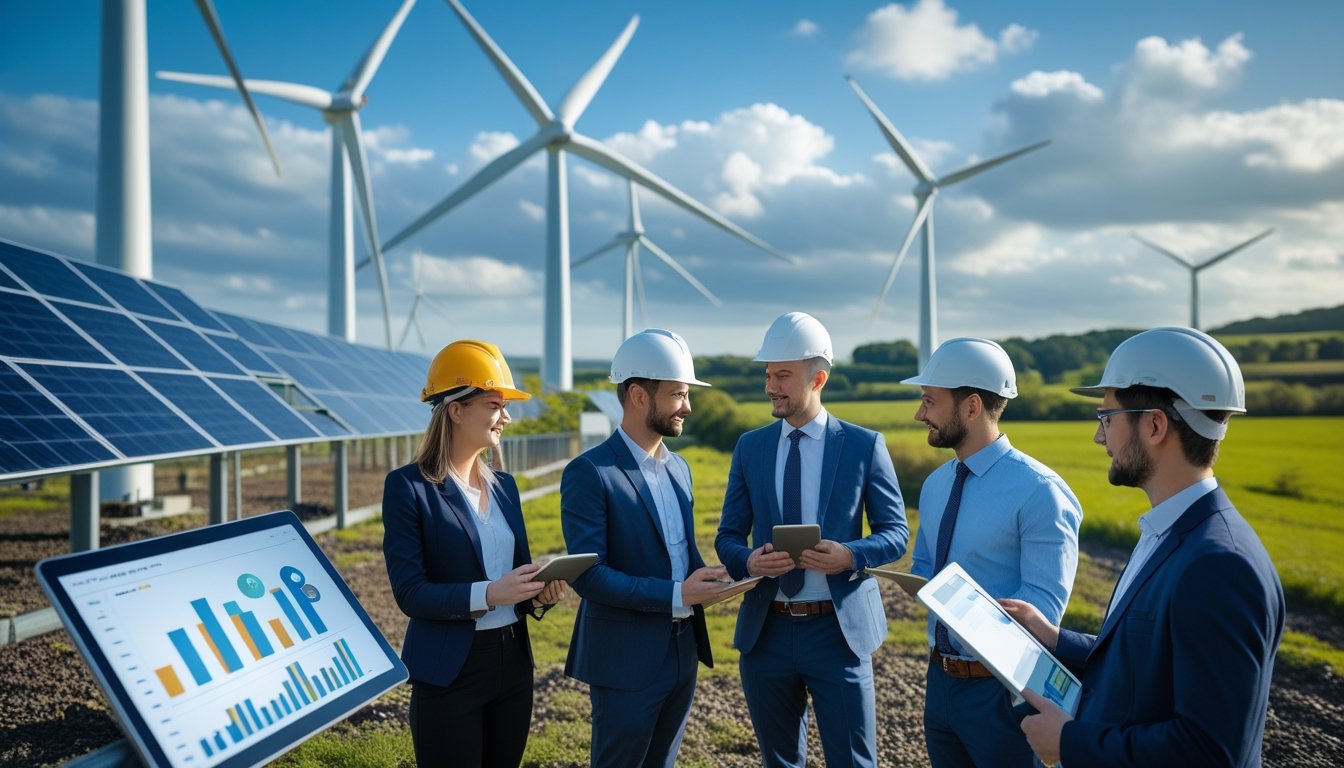Late updated: 26 May 2025 11:05
Written by: Eleanor Hartman
UK Renewable Energy Market Challenges: Navigating Obstacles to Growth
In the heart of the UK’s ambitious journey towards sustainable energy lies a multitude of challenges that the renewable energy market must confront. As a nation striving for cleaner alternatives, ensuring reliable energy supply remains a pressing concern. Among the most significant hurdles is the insufficient grid capacity, which hampers the integration of new renewable projects into the national grid.

Balancing energy supply and demand is another key issue, primarily due to the intermittent nature of renewable sources like wind and solar. This variability demands innovative solutions for energy storage and distribution to guarantee stability. Additionally, navigating the intricate maze of regulatory and financial landscapes poses persistent obstacles for stakeholders in the industry.
Key Takeaways
- Insufficient grid capacity limits renewable integration.
- Energy storage is crucial for balancing supply and demand.
- Regulatory and financial hurdles persist.
Key Challenges in the UK Renewable Energy Market
Renewable energy in the UK faces significant challenges, impacting policy, investment, infrastructure, and supply chains. Understanding these obstacles is essential for developing sustainable solutions and advancing the transition towards net zero.
Policy and Regulatory Uncertainty
Navigating the UK's policy and regulatory environment can be complex for renewable energy projects. With frequent shifts in government priorities and evolving regulations, project developers face challenges in planning and execution. Regulatory changes, especially those related to subsidies and incentives, can significantly affect the financial viability of these ventures.
We witness the impact of altering energy policies on investor confidence and project timelines. This unpredictability complicates long-term planning and can deter potential investment. Stable and consistent policies are essential to support a robust renewable energy sector and facilitate a smooth transition to a lower-carbon economy.
Investment and Financial Barriers
Investment challenges loom large over the sector, characterised by high upfront costs and intricate revenue models. Despite the potential for long-term savings, the initial financial burden can be prohibitive for many energy projects. Moreover, changes in government incentives often influence investment attractiveness, making funding less predictable.
Complex revenue streams and fluctuating market conditions exacerbate these issues. Encouraging private sector investment through attractive financial models and risk mitigation strategies is crucial. We must leverage innovative financing mechanisms to boost investor confidence and drive capital into clean energy technologies.
Grid Infrastructure and Energy Storage Constraints
The UK's shift towards renewable energy is often hindered by outdated grid infrastructure and energy storage constraints. A grid designed for traditional energy sources may struggle with the intermittency of renewables like wind and solar. This issue threatens energy stability and efficiency, complicating the supply-demand balance.
To mitigate these risks, enhancing grid capacity and integrating advanced energy storage solutions are essential strategies. Grid stability and effective energy storage are vital for maximising renewable energy usage. Investments in infrastructure upgrades and innovations in energy storage technologies must be priorities for meeting future energy demands.
Supply Chain Vulnerabilities
Renewable energy supply chains are susceptible to various challenges, from raw material scarcity to geopolitical risks. These issues can delay project timelines and increase costs. Component shortages and logistical hurdles exacerbate these vulnerabilities, affecting the timely delivery of critical parts.
Ensuring a secure and resilient supply chain is crucial for the success of energy projects. Diversifying supply sources and fostering local manufacturing capabilities can mitigate risks. In light of recent global supply disruptions, building robust supply chains is more important than ever for maintaining momentum in the renewable energy transition.
Sector-Specific and Technological Obstacles

The UK renewable energy sector faces specific and technological challenges, including wind power integration, biomass handling, hydrogen advancements, and the transition towards electric vehicles. Each area presents unique hurdles that affect their development and implementation.
Wind Power and Wind Energy Integration
Our significant investment in wind power presents both possibilities and challenges. The integration of wind energy into the national grid requires addressing intermittency because weather conditions can make energy output unpredictable. Advanced grid technologies and energy storage solutions are crucial.
Additionally, offshore wind farms often face logistical issues due to remote locations. Collaboration between stakeholders can enhance network capacity and grid stability. These actions are vital for maintaining the momentum of harnessing wind energy whilst ensuring the reliability of the energy supply.
Biomass and Waste Management Limitations
Biomass energy offers a renewable alternative, yet its sustainability hinges on efficient waste management systems. Biomass relies on organic material, often derived from waste, which requires careful handling to prevent environmental harm. Inefficient processes can result in higher emissions than fossil fuels.
Developing robust waste management infrastructure and aligning with stringent regulatory frameworks ensures sustainable biomass energy generation. Continuous research and technological advancements are needed to maximise energy yields while minimising the carbon footprint associated with processing waste materials.
Hydrogen and Emerging Clean Energy Solutions
Hydrogen is an emerging clean energy solution that holds great promise, particularly for industries reliant on fossil fuels. However, producing hydrogen sustainably, either through electrolysis or other methods, requires significant energy, often derived from renewable sources.
Collaboration between research institutions and industry players is essential to lower production costs and improve energy efficiency. Establishing a supportive regulatory framework could further fast-track hydrogen's integration. This collaborative effort is crucial for unlocking hydrogen's full potential as a viable renewable energy source.
Electric Vehicles and the Transport Energy Transition
The UK is seeing a shift towards electric vehicles (EVs) as a part of our broader energy transition strategy. The transport sector's success in reducing emissions via EVs depends on improving battery technology to enhance range and efficiency.
Developing nationwide charging infrastructure is equally important to support widespread EV adoption. Manufacturers are working on reducing production costs, which requires innovation in battery materials and recycling. These advancements will ensure that EVs not only compete with traditional vehicles on cost but also contribute positively to climate goals.
Frequently Asked Questions

Our examination of the UK's renewable energy sector focuses on several critical challenges. These include integration issues, government policies, and the influence of geographical conditions.
What obstacles does the UK face in integrating renewable energy sources?
The UK grapples with grid capacity challenges, limiting the integration of renewables like wind and solar. Infrastructure upgrades are needed to support increased energy influx. Additionally, the planning and consenting systems require improvements to enhance process efficiency for integrating renewable sources into the existing grid network.
How is intermittency affecting the progression of renewable energy in the UK?
Renewable energy sources, such as wind and solar, are inherently intermittent. This variability creates challenges for grid stability. The lack of predictability requires investment in energy storage solutions and demand-side management to maintain a steady energy supply and ensure reliability.
In what ways does government policy impact the development of renewable energies within the United Kingdom?
Government policy plays a pivotal role in shaping the renewable energy landscape. Policies that provide incentives for green energy projects and establish clear regulatory frameworks encourage investment. Conversely, insufficient support and complex regulations can hinder the growth of the renewable energy sector.
What role does financial investment play in the advancement of the UK's renewable energy sector?
Financial investment is a driving force behind renewable energy advancements. High upfront costs for technology and infrastructure necessitate substantial capital. Investment from both public and private sectors is essential to fund research, development, and deployment of innovative energy solutions.
How are technological advancements influencing the UK's transition to renewable energy?
Technological progress is pivotal in enhancing the efficiency and reliability of renewable energy sources. Innovations in energy storage, smart grid technologies, and advanced materials are accelerating the transition. These advancements improve energy capture, distribution, and storage, making renewables more viable.
What are the implications of the UK's geographic and climatic conditions on its renewable energy potential?
The UK's geography and climate offer both opportunities and constraints for renewable energy. Its extensive coastline and strong winds make it ideal for offshore wind energy. Meanwhile, the variability of weather patterns affects the consistency of solar energy. Strategic planning is required to leverage these geographical strengths effectively.